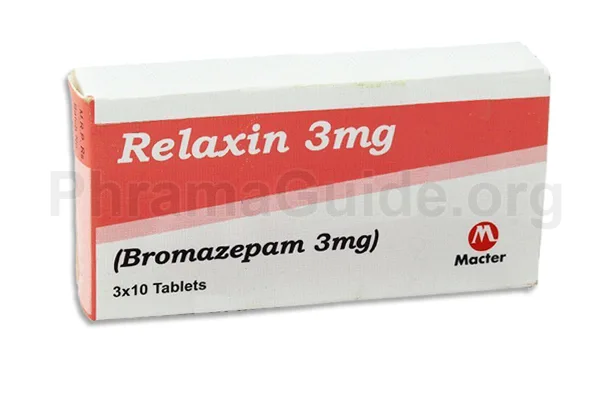Relaxin is primarily used for the treatment of anxiety disorders and short-term relief of anxiety symptoms. It belongs to the benzodiazepine class of drugs. Following are some common uses of Relaxin Tablet:
- Anxiety Disorders: Relaxin tablet is used for the management of various anxiety disorders, including generalized anxiety disorder (GAD), panic disorder, social anxiety disorder, and post-traumatic stress disorder (PTSD). It helps reduce excessive anxiety, worry, and associated symptoms.
- Insomnia Associated with Anxiety: Relaxin tablets may be used in individuals experiencing insomnia due to anxiety. By promoting relaxation and reducing anxiety, it can help improve sleep quality.
- Muscle Relaxation: Relaxin tablet has muscle relaxant properties and may be used to relieve muscle tension or spasms caused by anxiety or other factors.
- Sedation Before Medical Procedures: Relaxin tablets may be used as a premedication before certain medical procedures or surgeries to induce sedation, reduce anxiety, and promote relaxation.
Off-label Uses of Relaxin Tablet
- Premenstrual Syndrome (PMS): Relaxin tablets might be used off-label to help manage symptoms associated with premenstrual syndrome, such as mood swings, anxiety, and irritability.
- Adjunctive Treatment for Depression: In some cases, Relaxin tablets may be used as an adjunctive treatment alongside antidepressant medication for individuals with depression, particularly when anxiety symptoms are present.
- Alcohol Withdrawal Prevention: Relaxin tablets may also be used to prevent or reduce the severity of alcohol withdrawal symptoms in individuals who are at risk or have a history of alcohol dependence.

What is Relaxin?
Relaxin is one of the leading brands of Bromazepam, manufactured and marketed by Macter International (Pvt) Ltd, Pakistan.
Relaxin Alternatives : Other Similar Brands
Here are some alternative brands of Relaxin and their manufacturers.
- Lexotanil : Roche Pakistan, Ltd.
- Sambro : Sami Pharmaceuticals (Pvt) Ltd, Pakistan.
- Brolite : Standpharm Pakistan (Pvt) Ltd.
- Bromalex : Indus Pharma (Pvt) Ltd, Pakistan.
- Anxit : Atco Laboratories Ltd, Pakistan.
- Anzonil : Global Pharmaceuticals, Pakistan.
- Brexxel : High-Q International.
- Durazanil : Tabros Pharma.
- E-ZE : Genix Pharma (Pvt) Ltd.
- Freedom : Libra Pharmaceuticals (Pvt) Ltd.
Relaxin : Available Formulations and Strengths
Presently, Relaxin is available in Tablet Form with the following Strength.
Relaxin Tablet : 3mg strength.
Who Should Not Use Relaxin?
Relaxin has several contraindications, which are specific situations or conditions where the use of Relaxin is not recommended due to the potential risks outweighing the benefits.
Hypersensitivity: Relaxin is contraindicated in individuals who have a known hypersensitivity or allergy to Relaxin or other benzodiazepines. Allergic reactions can range from mild to severe and may include rash, itching, swelling, or difficulty breathing.
Acute narrow-angle glaucoma: Relaxin should not be used in individuals with acute narrow-angle glaucoma, a condition characterized by increased pressure in the eye. The medication can further increase eye pressure, potentially worsening the condition.
Severe respiratory insufficiency: Relaxin is contraindicated in individuals with severe respiratory insufficiency or respiratory failure. It can suppress respiratory function, which may be problematic in individuals with compromised respiratory function.
Severe hepatic impairment: Relaxin should be used with caution in individuals with severe hepatic impairment or liver disease. The medication’s metabolism and elimination may be impaired in such cases, potentially leading to increased drug levels and prolonged effects.
Sleep apnea syndrome: Relaxin is contraindicated in individuals with sleep apnea syndrome, a condition characterized by episodes of paused or shallow breathing during sleep. The medication can further suppress respiration, exacerbating the condition.
Myasthenia gravis: Relaxin should be used with caution in individuals with myasthenia gravis, a neuromuscular disorder characterized by muscle weakness. The medication can worsen muscle weakness and impair muscle function.
What is the Recommended Daily Dosage of Relaxin?
Relaxin Dose for Anxiety Disorders:
-
- Adults: One tablet of 3mg, Two times a day.
The maximum dose is three tablets of 3mg per day. - Elderly patients (65 years or above): One tablet of 3mg, once a day.
- Adults: One tablet of 3mg, Two times a day.
Relaxin Dose for Insomnia Associated with Anxiety:
-
- Adults: One tablet of 3mg, Two times a day.
The maximum dose is three tablets of 3mg per day. - Elderly patients (65 years or above): One tablet of 3mg, once a day.
- Adults: One tablet of 3mg, Two times a day.
How Relaxin Works?
Relaxin works by binding to specific sites on the GABA-A receptors and enhances the binding of GABA to these receptors. This increases the frequency and duration of the chloride ion channel openings, leading to an increased influx of chloride ions into the neurons. The increased inhibitory effects of GABA result in a reduction of neuronal activity, leading to sedation, muscle relaxation, anxiolytic (anti-anxiety) effects, and anticonvulsant effects.

Leave A Comment